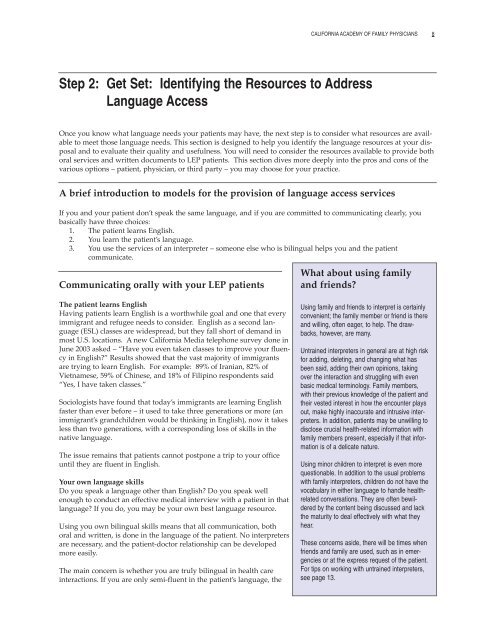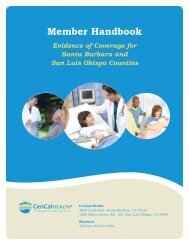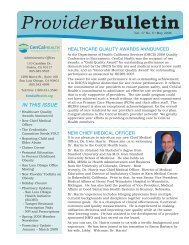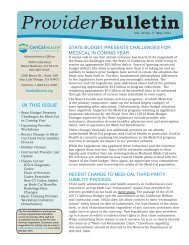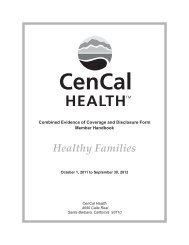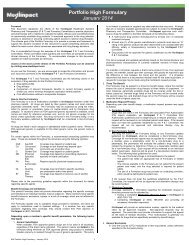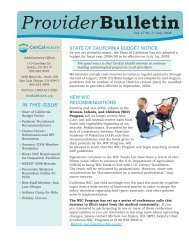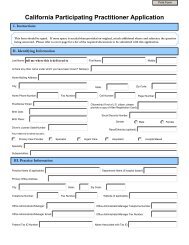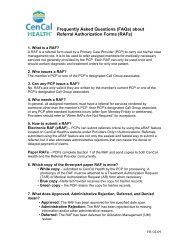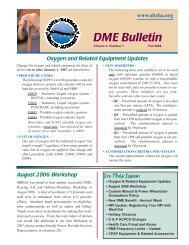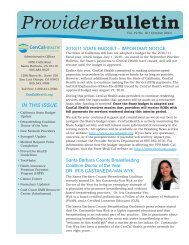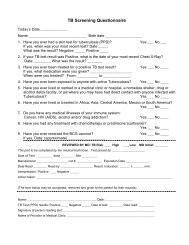Addressing Language Access Issues in Your Practice: A Toolkit for ...
Addressing Language Access Issues in Your Practice: A Toolkit for ...
Addressing Language Access Issues in Your Practice: A Toolkit for ...
Create successful ePaper yourself
Turn your PDF publications into a flip-book with our unique Google optimized e-Paper software.
CALIFORNIA ACADEMY OF FAMILY PHYSICIANS 8<br />
Step 2: Get Set: Identify<strong>in</strong>g the Resources to Address<br />
<strong>Language</strong> <strong>Access</strong><br />
Once you know what language needs your patients may have, the next step is to consider what resources are available<br />
to meet those language needs. This section is designed to help you identify the language resources at your disposal<br />
and to evaluate their quality and usefulness. You will need to consider the resources available to provide both<br />
oral services and written documents to LEP patients. This section dives more deeply <strong>in</strong>to the pros and cons of the<br />
various options – patient, physician, or third party – you may choose <strong>for</strong> your practice.<br />
A brief <strong>in</strong>troduction to models <strong>for</strong> the provision of language access services<br />
If you and your patient don’t speak the same language, and if you are committed to communicat<strong>in</strong>g clearly, you<br />
basically have three choices:<br />
1. The patient learns English.<br />
2. You learn the patient’s language.<br />
3. You use the services of an <strong>in</strong>terpreter – someone else who is bil<strong>in</strong>gual helps you and the patient<br />
communicate.<br />
Communicat<strong>in</strong>g orally with your LEP patients<br />
What about us<strong>in</strong>g family<br />
and friends?<br />
The patient learns English<br />
Hav<strong>in</strong>g patients learn English is a worthwhile goal and one that every<br />
immigrant and refugee needs to consider. English as a second language<br />
(ESL) classes are widespread, but they fall short of demand <strong>in</strong><br />
most U.S. locations. A new Cali<strong>for</strong>nia Media telephone survey done <strong>in</strong><br />
June 2003 asked – “Have you even taken classes to improve your fluency<br />
<strong>in</strong> English?” Results showed that the vast majority of immigrants<br />
are try<strong>in</strong>g to learn English. For example: 89% of Iranian, 82% of<br />
Vietnamese, 59% of Ch<strong>in</strong>ese, and 18% of Filip<strong>in</strong>o respondents said<br />
“Yes, I have taken classes.”<br />
Sociologists have found that today’s immigrants are learn<strong>in</strong>g English<br />
faster than ever be<strong>for</strong>e – it used to take three generations or more (an<br />
immigrant’s grandchildren would be th<strong>in</strong>k<strong>in</strong>g <strong>in</strong> English), now it takes<br />
less than two generations, with a correspond<strong>in</strong>g loss of skills <strong>in</strong> the<br />
native language.<br />
The issue rema<strong>in</strong>s that patients cannot postpone a trip to your office<br />
until they are fluent <strong>in</strong> English.<br />
<strong>Your</strong> own language skills<br />
Do you speak a language other than English? Do you speak well<br />
enough to conduct an effective medical <strong>in</strong>terview with a patient <strong>in</strong> that<br />
language? If you do, you may be your own best language resource.<br />
Us<strong>in</strong>g you own bil<strong>in</strong>gual skills means that all communication, both<br />
oral and written, is done <strong>in</strong> the language of the patient. No <strong>in</strong>terpreters<br />
are necessary, and the patient-doctor relationship can be developed<br />
more easily.<br />
The ma<strong>in</strong> concern is whether you are truly bil<strong>in</strong>gual <strong>in</strong> health care<br />
<strong>in</strong>teractions. If you are only semi-fluent <strong>in</strong> the patient’s language, the<br />
Us<strong>in</strong>g family and friends to <strong>in</strong>terpret is certa<strong>in</strong>ly<br />
convenient; the family member or friend is there<br />
and will<strong>in</strong>g, often eager, to help. The drawbacks,<br />
however, are many.<br />
Untra<strong>in</strong>ed <strong>in</strong>terpreters <strong>in</strong> general are at high risk<br />
<strong>for</strong> add<strong>in</strong>g, delet<strong>in</strong>g, and chang<strong>in</strong>g what has<br />
been said, add<strong>in</strong>g their own op<strong>in</strong>ions, tak<strong>in</strong>g<br />
over the <strong>in</strong>teraction and struggl<strong>in</strong>g with even<br />
basic medical term<strong>in</strong>ology. Family members,<br />
with their previous knowledge of the patient and<br />
their vested <strong>in</strong>terest <strong>in</strong> how the encounter plays<br />
out, make highly <strong>in</strong>accurate and <strong>in</strong>trusive <strong>in</strong>terpreters.<br />
In addition, patients may be unwill<strong>in</strong>g to<br />
disclose crucial health-related <strong>in</strong><strong>for</strong>mation with<br />
family members present, especially if that <strong>in</strong><strong>for</strong>mation<br />
is of a delicate nature.<br />
Us<strong>in</strong>g m<strong>in</strong>or children to <strong>in</strong>terpret is even more<br />
questionable. In addition to the usual problems<br />
with family <strong>in</strong>terpreters, children do not have the<br />
vocabulary <strong>in</strong> either language to handle healthrelated<br />
conversations. They are often bewildered<br />
by the content be<strong>in</strong>g discussed and lack<br />
the maturity to deal effectively with what they<br />
hear.<br />
These concerns aside, there will be times when<br />
friends and family are used, such as <strong>in</strong> emergencies<br />
or at the express request of the patient.<br />
For tips on work<strong>in</strong>g with untra<strong>in</strong>ed <strong>in</strong>terpreters,<br />
see page 13.


